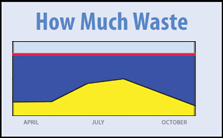Forecasters call for hot, dry summer in Alberta
If you like to spend your time in the Great Outdoors, this coming summer is for you.
Weather forecasters are calling for a hotter-than-usual season for most of Alberta.
AccuWeather.com senior meteorologist Brett Anderson says the El Nino weather phenomenon is on its way and is expected to bring warmer-than-average temperatures to most of Canada, particularly the Prairies.
“The whole key to this summer is going to be longer, more prolonged heat,” says Anderson.
“You’re also going to see less in terms of rainfall,” he adds.
As a result, a considerable more amount of potable water than is usual will be used for irrigation purposes.
“There couldn’t be a more optimum time for people to ditch outmoded timer controllers for highly efficient climate controlled irrigation,” says Graham Duffy, CEO of ExactET Systems Inc.
“Certainly in a dry summer, it is obvious more water will be used to keep landscapes green and healthy. But the ‘smart’ controllers will ensure that green spaces will only be watered when the soil demands it.”
Duffy adds, “Every precious drop saved is even more important in a long, dry season, especially when the threat of watering restrictions is very real.”
In July and August, Calgary typically averages a daily high of 22 C. Anderson said this year, average temperatures could be two degrees higher than that.
But while that may sound good to outdoor enthusiasts, Anderson says it’s part of a worrisome long-term warming trend.
“Over the past 10 years, the majority of them (summers) have been warmer than normal, and it looks like this summer will be no exception,” he says.
“It’s very concerning. As it gets hotter across the Prairies, it gets drier, and that’s not a good thing.”
Harry Brook, crop specialist with Alberta Agriculture, said farmers have had a great start to seeding this year, thanks to an early spring and timely rainfall.
But, he said, a drier than normal summer could be a problem, especially since so little snow fell over the winter.
The only areas of Canada expected to be cooler than normal are parts of the West Coast.


